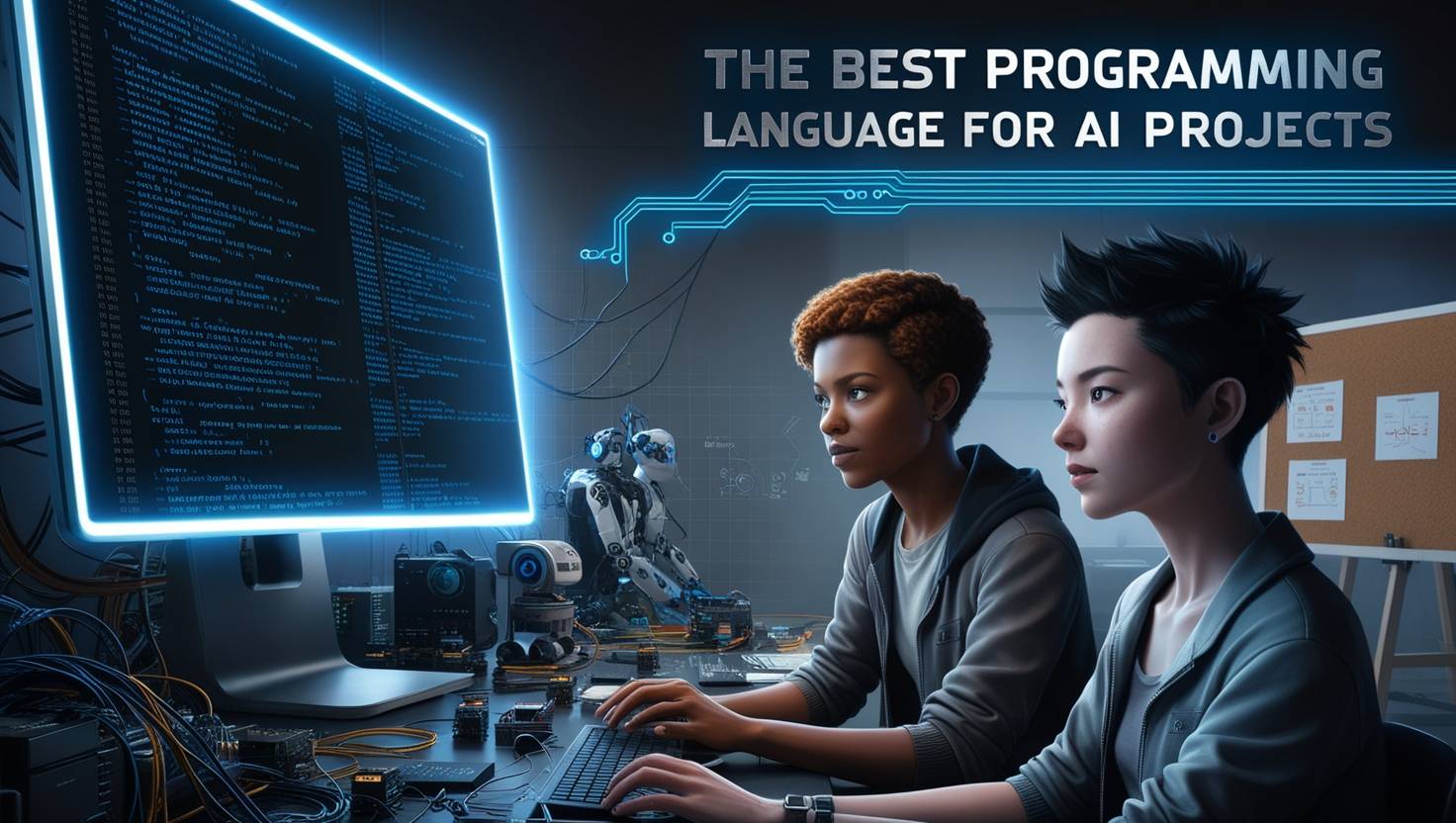Hey there, AI enthusiast! If you’re here, it’s because you want to dive into the world of Artificial Intelligence, but with so many programming languages out there, how do you know which is the the best programming language for AI Projects? Because the language you choose can mean the difference between scaling your AI project to new heights or watching it gather dust.
The Secret Sauce Behind AI? Picking the Right Language!
AI development is exploding. From recommendation engines to image recognition to predictive analysis, AI is where the magic happens in modern business. But here’s the deal: not all programming languages are created equal in the AI arena. Picking the right one means choosing speed, efficiency, and, most importantly, scalability.
Python – The Grand Master for AI Development
Alright, let’s start with the crowd-favorite, Python. Python is like that dependable friend who always has your back. It’s straightforward, packed with libraries like TensorFlow, PyTorch, and Keras, and it makes AI development super accessible.
Why Python? Simple:
- Simplicity: Its syntax is clean, which means you spend less time debugging and more time actually building.
- Community and Libraries: AI is all about neural networks, machine learning, and data science, and Python has libraries for all these.
- Huge Support Network: Stuck? Chances are someone has already solved your issue on Stack Overflow or GitHub.
Python’s like the Swiss Army knife of AI development. It’s incredibly versatile, so if you’re not sure where to start, this is it.
R – For Hardcore Data Scientists
If your focus is on statistics-heavy projects, R might be your best bet. R is specialized for data analysis and visualization, making it ideal for statistical AI tasks. For those of you who want to dive deep into data manipulation and statistical modeling, R is your golden ticket.
What makes R special?
- Data-Centric: Perfect for any projects centered on data mining and analysis.
- Visualization: R has killer visualization capabilities, which help you present data insights beautifully.
- Advanced Statistics: When complex statistics are involved, R is the go-to.
Now, R might be a little trickier to master than Python, but it shines when handling complex statistical data.
Java – The Powerhouse for Big Data AI Projects
Java is a beast when it comes to big enterprise-level projects. Major companies with huge data demands use Java because it’s fast, reliable, and integrates seamlessly into their existing systems.
Why go with Java?
- Scalability: Java scales like a dream, which is why you’ll find it powering backend systems.
- Compatibility: Works well with other languages, making it perfect for building robust, multi-language applications.
- Security: Java’s security features make it highly suitable for financial AI applications where data protection is critical.
Java might not have as many AI libraries as Python, but its strong integration and scalability make it a smart choice for big data.
JavaScript – The Hidden Gem for AI in the Browser
JavaScript isn’t just for front-end developers anymore! With libraries like TensorFlow.js, you can now run AI models right in the browser. Imagine being able to create interactive, real-time AI apps that run on any device – that’s the magic of JavaScript.
Why JavaScript?
- Run Anywhere: Since JavaScript is browser-friendly, your AI applications become platform-agnostic.
- TensorFlow.js: This library opens up AI possibilities within web apps.
- High Interactivity: Perfect for AI-driven web apps that demand a user-friendly front end.
JavaScript for AI is still relatively new, but it’s rapidly evolving. If you’re looking to build something interactive that lives in the browser, JavaScript is a game-changer.
C++ – The Speed Demon for High-Performance AI
When you need raw power, C++ is your go-to. It’s widely used for machine learning and deep learning projects that require heavy lifting on computational power. You’ll find C++ in systems that need real-time processing, like robotics or image processing.
Why pick C++?
- Speed: For projects where every millisecond counts, C++ has the speed advantage.
- Hardware Interaction: Great for AI projects that rely on close hardware interaction, like robotics.
- Control: C++ allows low-level manipulation, giving you ultimate control over system resources.
C++ might have a steep learning curve, but if performance is your top priority, it’s hard to beat.
The Million-Dollar Question: Which One Should You Choose?
Choosing a language is all about aligning with your project goals. Here’s a quick breakdown to help you decide:
- For Beginners or General AI Projects: Go with Python. It’s easy, versatile, and has a huge support network.
- For Data-Centric Projects: Choose R if your project involves hardcore statistics and data visualization.
- For Scalable, Big-Data Projects: Java is your best bet, especially if you’re working in a corporate environment.
- For Web-Based, Interactive AI: Go with JavaScript if you want to bring AI directly into the browser.
- For High-Performance Needs: If speed and control are critical, C++ is unbeatable.
Each language brings its own magic to the table. The right choice means you’re one step closer to unlocking the full potential of AI.
Final Takeaway
In the world of AI, the programming language you choose is more than just a tool – it’s a partner in building your vision. Think of it like picking the right funnel strategy: with the wrong one, you’ll struggle, but with the right one, you’ll thrive.
So don’t overthink it. Pick the language that aligns with your goals and get building! Because that’s what AI is all about – creating, innovating, and making the impossible possible.
FAQ: Choosing the Best Programming Language for AI Projects
Q1: Why is Python considered the best language for AI?
Python is popular in AI because of its simplicity, readability, and extensive libraries tailored for machine learning and data science. Libraries like TensorFlow, PyTorch, and scikit-learn make complex AI development much more accessible, allowing developers to focus on innovation rather than technical hurdles.
Q2: Is R only useful for statistical AI projects?
Yes, R is ideal for statistical tasks and data analysis due to its powerful data visualization and statistical modeling tools. If your project involves heavy data manipulation and statistical computation, R is perfect. But for general-purpose AI, Python offers broader flexibility.
Q3: How do I know if I should use Java for my AI project?
Java is a great fit if your project requires high scalability and security, especially for large-scale or enterprise-level applications. It’s often used in big data applications and is favored in corporate settings where stability, security, and integration with existing systems are crucial.
Q4: Can I really use JavaScript for AI, or is it just for web development?
Yes, JavaScript can be used for AI! Thanks to TensorFlow.js and other libraries, you can run AI models in the browser. This makes it ideal for interactive AI applications that run on any device with a web browser, allowing real-time, user-friendly interfaces.
Q5: Is C++ worth the learning curve for AI projects?
If your project demands high performance and speed—like in robotics, image processing, or real-time applications—C++ is an excellent choice. It offers precise control over system resources, making it ideal for computation-heavy AI tasks, though it’s more complex to learn than Python or JavaScript.
Q6: Which language should a beginner in AI start with?
For beginners, Python is hands-down the best place to start. It’s easy to learn, has an enormous support community, and includes libraries that make AI development far easier. Once you’re comfortable, you can explore other languages if your projects require specialized capabilities.
Q7: Can I combine languages in an AI project?
Absolutely! Many AI projects combine languages to leverage the strengths of each. For example, you might use Python for model development, Java for backend scalability, and JavaScript for a web-based user interface. Combining languages can create powerful, dynamic applications.
Q8: How does the choice of language affect project scalability?
Some languages, like Java, are particularly well-suited for scalable projects because they integrate well with enterprise systems and handle large datasets efficiently. For AI solutions that require high scalability, choosing Java or Python ensures smoother handling of growing data and user demands.
Q9: What language is best for AI in mobile applications?
If you’re focusing on mobile, consider Java for Android or Swift for iOS. However, JavaScript is also a great choice when using frameworks like React Native, which can bring AI-powered features to both iOS and Android.
Q10: How does language choice impact the speed of AI model training?
Languages like C++ are faster and ideal for computationally intensive tasks, but languages like Python can achieve similar performance with the right libraries, thanks to GPU support in libraries like TensorFlow and PyTorch.





